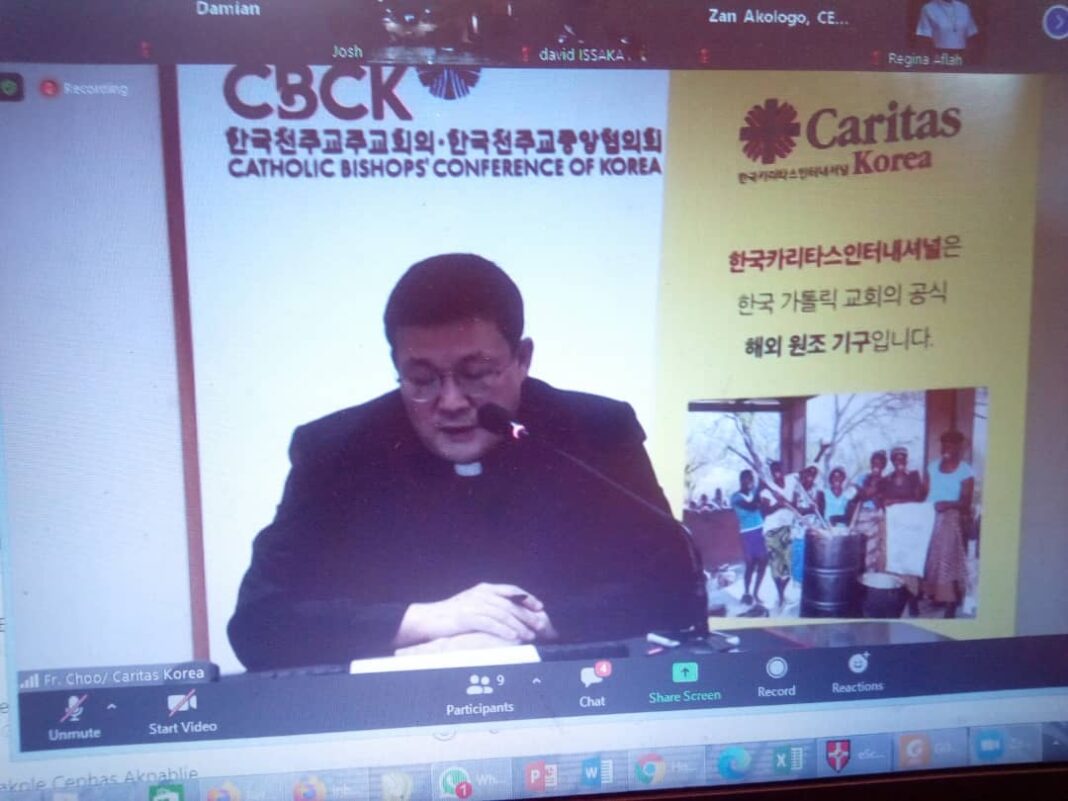In a bid to help give skills training to the unemployed youth in Ghana, Caritas Korea has indicated its readiness to collaborate closely with the Church in Ghana to give hope to the less privileged in society especially the unemployed through the Alternative Skills Training Project.
The Executive Director of Caritas Korea, Fr. Paul Sunghun Choo announced this at a virtual ceremony to officially launch the caritas Korea-Caritas Ghana partnership during which a grant of $54,700 was awarded targeted at unemployed youth especially girls.
“As Caritas Ghana and Korea are now taking the first step together, it is my humble hope and prayer that Caritas Korea will be able to develop close collaboration and fraternal partnership with Caritas Ghana through this project,” Fr. Choo said at the launching of the partnership project in Accra on June 16, 2021.
One of the major challenges and disturbing phenomenon facing most young people in Ghana today is unemployment especially newly graduated students from tertiary institutions. Every year, hundreds of graduates leave School in search of non-existing jobs.
Ghana is faced with 12% youth unemployment and more than 50% underemployment, both higher than overall unemployment rates in Sub-Saharan African countries. Despite major investments by both government and private sector, this challenge will intensify if job opportunities remain limited.
At the virtual ceremony, Fr. Choo stated, “I have every confidence that this project will be a great blessings for both of us. What Caritas Korea want to do with Caritas Ghana is not to merely give them funds but to support and help young people in Ghana so that they can come closer to their life goals with very tiny contribution of Caritas Korea.”
“I believe that it is great news for them to know ‘they have chance’, noting “as a Catholic Organization, Caritas Korea wish them to know ‘Jesus cares for them,’” he added.
Fr. Choo said through this project, Caritas Korea would now be establishing a blessed partnership with Caritas Ghana for the first time and pointing out that “Caritas Korea has not been able to expand its support in West Africa due to distance and language barriers.”
Launching the partnership, the Most Rev. Joseph Osei-Bonsu, Episcopal President of Caritas Ghana, thanked Most Rev. John Baptist Shin-chul JUNG, for his friendship, saying, “I accept, with gratitude, this grant of USD54,700.00 from Caritas Korea on behalf of Caritas Ghana and the Ghana Catholic Bishops’ Conference.”
Thanking Caritas Korea for the support, he announced that Caritas Ghana would expand its efforts at resettlement and reintegration of vulnerable youth who are particularly displaced in the cities due to the adverse impact of COVID-19.
During their 2019 plenary meeting at Elmina in the Cape Coast Archdiocese, the Bishops of Ghana expressed worry about the steep rise in youth unemployment in the country describing it as “a veritable national security threat which has to be addressed immediately and urgently with a well-articulated programme.”
“We urge all stakeholders, the Government, Private Sector, Political Parties, Faith Based Organizations and Civil Society Organizations to treat the growing menace of joblessness among our youth as a national emergency and come up with practical and innovative solutions to relieve our young citizens of the lingering stress of persistent unemployment,” said the Bishops in a Communique issued at Cape Coast in 2019.
The Bishops noted, “The youth must take note of the changing times by being more creative and to explore the available opportunities to establish their own businesses to be self-employed.”
A 2020 new World Bank report titled “Youth Employment Programs in Ghana: Options for Effective Policy Making and Implementation” has identified agribusiness, entrepreneurship, apprenticeship, construction, tourism and sports as key sectors that can offer increased employment opportunities for Ghanaian youth.
The report, which has been described as another milestone towards addressing the unemployment challenge, also calls for more investments in career guidance and counseling, work-based learning, coaching, and mentoring to equip young people with the skills needed for work.



